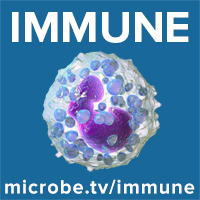Immune explains a study of 125 COVID-19 patients by deep immune profiling, which revealed three immunotypes associated with poor clinical prognosis or recovery.
Immune continues a discussion of the immune response to infection with SARS-CoV-2, including inflammatory responses and disease, antibody and T-cell responses, and vaccines, and answers to listener questions.
Immune continues a discussion of the immune response to infection with SARS-CoV-2, including vaccines and immunity, effects of BCG and OPV, immunity passports, and answers to listener questions.
Brianne Barker returns to continue a discussion of the immune response to infection with SARS-CoV-2, including use of steroid, coagulation in some patients, cytokine storm, and vaccines.
Brianne Barker joins Immune to discuss the immune response to infection with SARS-CoV-2, including immune respones, pathogenesis, immunopathology and more.
Irene Salinas joins Immune to reveal the work of her laboratory on the evolution of mucosal immune responses in teleost fish, the oldest living bony vertebrates.
Steph explains how sepsis induces protective immune memory in NK cells, via histone methylation of the interferon gamma enhancer.
Michael Mina joins the Immune team to explain his findings that measles diminishes pre-existing antibodies that protect against infection with other pathogens.
The Immune team explains that short chain fatty acids produced by microbial fermentation of fiber rewire metabolism to enable the production of memory T cells.
The Immune team reveals a new type of T helper cell that drives the production of IgE, leading to allergic responses.




